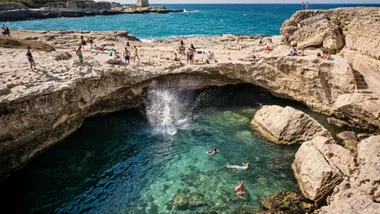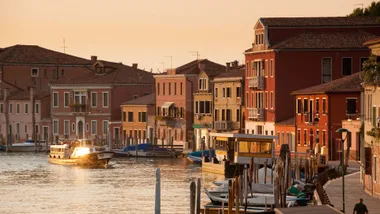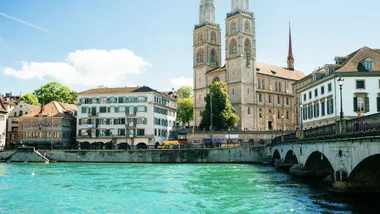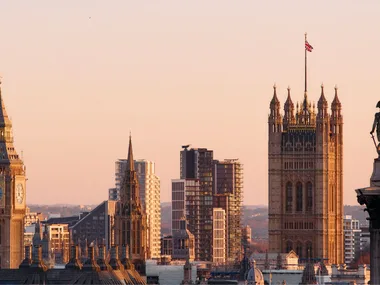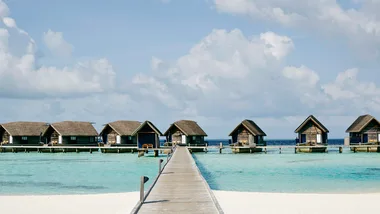THE FINE PRINT
GETTING THERE
For details of airlines servicing Oman, go to
.
STAY
Packages are available from $807 per person for three nights in a Serai room. Al Khuwair, Muscat, Sultanate of Oman, 1800 667 731.
Let’s assume that TS Eliot never stayed at The Chedi Muscat. It was Eliot who wrote that it’s the journey – not the arrival – that matters. The Chedi Muscat is one of those precious places that has perfected the sense of arrival. Pass through its portals and you are immediately rewarded for the journey.
Around the world a few great hostelries capture the spirit of their destination – the old Raffles in Singapore, The Peninsula in Hong Kong, The Ritz in Paris, The Chedi Muscat in Oman – places that have become part of the romance and mystique of their location. Far too many others are sanctuaries from the soul of their cities.
The Chedi Muscat is a monument to the traditions of Arabian hospitality and to the significance of Oman eventually opening its arms to the rest of the globe. As recently as man walking on the moon, Oman’s doors were closed to the world – literally and figuratively. Until 1970, the great wooden gates to Muscat, Oman’s capital, would be locked each evening at dusk as a symbolic defence against anything that might corrupt Islamic and Arabian values.
Today’s Oman, however, is both progressive and impressive and probably half a step ahead of the aspirations of its generally conservative population. The vision and benevolence of the current Sultan Qaboos bin Said are qualities that can give absolute authority a good name. Change is no longer feared in Oman, but nor is it embraced for no good reason.
While Dubai, Bahrain and even Qatar have pulled out all stops to become the flashy cultured pearls of the Arabian Peninsula, Oman has been at pains to provide visitors with an authentic indigenous cultural experience. Careful conservation of its Arabian heritage, its tribal traditions and its unspoiled natural environment makes Oman the yin to Dubai’s theme-park yang. Its vision for the future is as commendable as its respect for the past and, where elsewhere these two would provide a vivid contrast, in Oman it’s a seamless progression.
Oman is a destination that rewards the traveller more than the tourist. It rewards those with a sense of adventure rather than those who merely see what they’ve come to see. Muscat itself has defiantly maintained its old-world character and charm, but pampered parks and gardens contradict its desert heritage. It and the commercial centre of Muttrah are twin towns separated by two kilometres of sweeping coastline.
Beyond the capital, travellers have a wealth of options: Nizwa, the old capital of Oman, which still has special spiritual significance to Omanis; the dramatic mountain scenery of Jebel Shams; the ancient seaport of Sur; the Wahiba Sands, traditional home of the nomadic Bedouin; the picturesque harbour of Khasab; the southern city of Salalah.
The Chedi Muscat – like exotic Muscat itself – displays an attractive fusion of Arab tradition and global awareness. It has faced challenges from other opulent resort developments, and seen them off by steadfastly sticking to a charter of allowing its guests to experience the soul of Arabia. This has a lot to do with the generosity of its hospitality and more than a bit to do with a tranquillity created by its elegant architecture.
Okay, there are impressive Chedi hotels elsewhere in the world – in Milan, Bali, Phuket and Chiang Mai – but at The Chedi Muscat the romance and mystery of the Arabian Peninsula waft through the entire property the way frankincense perfumes its lobby lounge. The question ‘Which Chedi are we in?’ never arises here. The experience is undiluted Arabia.
Most recently, the hospitality headlines in Oman have been grabbed by the Six Senses Hideaway Zighy Bay resort on the tip of the Musandam Peninsula. The resort is closer to Dubai than it is to Muscat and, while there’s a nod to Oman’s heritage in its traditional Omani village theme, most guests will be happy to remain within the beach resort insulated from the real Oman. Its 81 villas are clustered on a stretch of beachfront, and its sense of arrival is somewhat different from that of the Chedi. Guests are encouraged to leap from a precipice high in the Hajar Mountains and paraglide 500 metres down to check in.
The Chedi Muscat is also located on a stretch of private beach, but still close to the international airport and about 10 minutes drive from downtown Muscat. Set in a palm-fringed garden defined by low hedges and formal water features, the impact of the property is provided by a stunning minimalist aesthetic that embraces basic design elements of traditional Omani architecture.
Belgian architect Jean-Michel Gathy has used a combination of curved and pointed arches, high narrow windows, squat domes and gleaming white façades to give the hotel a modern and elegant style with an unmistakable Arabian reference. This is the ‘less-is-more’ school of architecture at its smartest, with Gathy’s minimalism creating an ultra-modern expression of Eastern opulence.
Accommodation options are three different room styles plus private garden suites, the interiors managing to be almost impossibly exotic and understated at the same time. The geometric beauty of the rooms is given extra drama with stark black and white surfaces framing fabrics in muted colours, natural timber finishes, black granite and shimmering cream marble. Mahogany, teak and walnut furniture is high-chic geometric. In such a dramatic environment, Oriental carpets seem to permeate the soul of the guest.
Club suites come in both single-storey and two-storey format and encompass a bedroom, living room, private patio and epic bathroom with a sunken bath cast in black terrazzo and a rainforest shower.
Facilities and amenities are lavish but, for all the amazing features, The Chedi Muscat really scores with what it doesn’t have.
For instance, it doesn’t have the high-traffic flow of most major hotels. Freestanding suites dotted throughout the landscaped grounds see to that, extending an extreme degree of privacy and serenity. It doesn’t have the hustle and bustle of a hotel going about its business, and it doesn’t have the usual interruptions or the need to adjust to the hotel’s routine. While service is attentive but discreet, it is not so discreet that room service has an unlisted number like some ultra-pretentious establishments.
As for the generosity of the hospitality, return to your suite in the late afternoon after a day at the souk or the forts or the Nizwa markets and a welcome wooden tray awaits. Its three glass decanters contain not shampoo, conditioner and bath gel, but whisky, gin and vodka. There is a freshly replenished ice bucket and jars of lemon pistachios, apricots and salted almonds. Also a dish of fresh dates, lychees, kiwifruit, Turkish delights and tiny macaroons, plus a chilled bottle of Champagne. And, to set the mood, an iPod pre-loaded with more than 1500 pieces of music. Anticipating desires, and then exceeding them, seems to be what Arabian hospitality is all about.
The Chedi Muscat’s private beach slopes up to a tropical garden in which are set two infinity pools with luxury cabanas offering bar service and refreshments, and a tennis complex complete with resident professional coaching.
Of course, it’s not possible to hole up in a posh resort these days without having your skin scrubbed and polished, and the Chedi Spa is rated highly by those experienced in the sensual vices. Two- and three-hour treatments range through such things as the aromatherapy foot polish, the sea mineral body scrub and the seaweed body wrap, as well as massages, milk baths and masks.
Those who prefer elixir rituals of a more gustatory nature will find that The Chedi Muscat emphasises its excellence in the dining arena. The signature dining room, The Restaurant, features four open kitchens presenting four different culinary styles – Arabian, Mediterranean, Asian and Indian.
The Beach Restaurant overlooking the Gulf of Oman features an innovative menu stacked with seafood offerings such as tempura swordfish served with spiced barbecued pineapple, and crab rémoulade with seared foie gras. Club suite guests have access to their own library-style club lounge equipped with laptops with free internet access. The lounge also provides an exclusive breakfast venue and a sanctuary for complimentary pre-dinner cocktails and canapés.
The Restaurant also boasts Oman’s biggest wine cellar specialising in a vast array of Champagnes. All in all, it’s an experience that is just one more reflection of the many exotic influences that have coloured the richness of Oman’s culture.
 Anson smart
Anson smart
